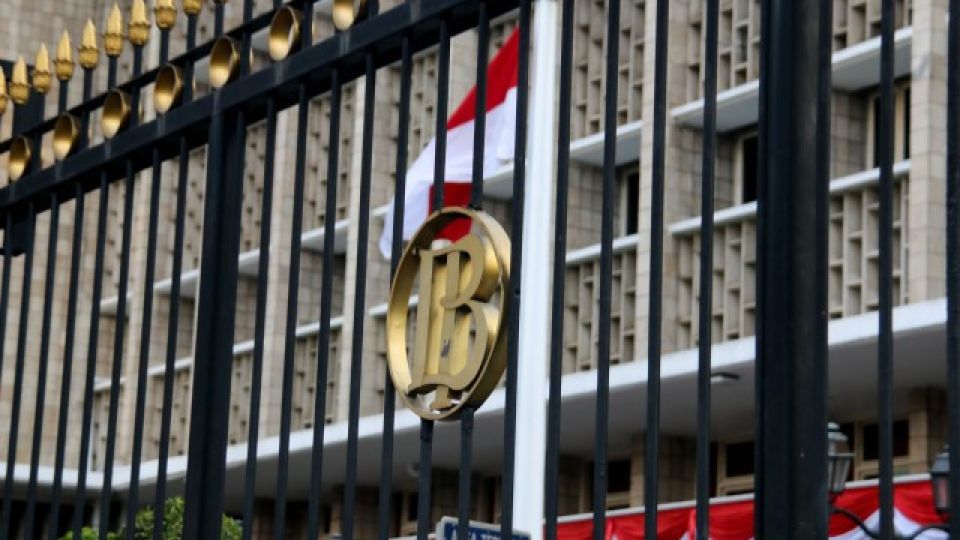April 24, 2025
JAKARTA – Bank Indonesia (BI) has decided to keep its key interest rates in place as the rupiah remains weak, and noted that mounting global pressure stemming from trade disruption threatens Indonesia’s economic growth.
Following the central bank’s two-day monthly policy meeting, BI Governor Perry Warjiyo announced in a press conference on Wednesday that the key interest rate, the BI Rate, will remain at 5.75 percent, where it has been since the central bank slashed it by 25 basis points (bps) in January.
“Global economic uncertainties have been pushed higher by America’s reciprocal tariff policy,” Perry said, explaining that the policy had forced the central bank to revise down its projection for global economic growth from the initial forecast of 3.2 percent to 2.9 percent.
United States President Donald Trump announced earlier this month that the US would impose a 10 percent blanket tariff on almost all imports, followed by varying additional tariffs for countries the US has a trade deficit with, 32 percent in Indonesia’s case.
Just hours after the so-called reciprocal tariff took effect, Trump announced a 90-day pause on the policy, during which countries can negotiate with Washington, and Jakarta was among the countries offering concessions to avert the reciprocal tariffs.
The pause does not apply to China, which is the main target of the US trade policy and faces punishingly high import tariffs on goods shipped to the US.
The second-largest economy has chosen to retaliate against the US, as have Canada and the European Union, leading to global tensions set to reduce trade volumes and therefore worldwide economic growth.
Read also: Govt vows to trade with China as usual despite US-China trade war
Not only does the tariff war affect economic growth and currency stability, Perry explained, but it also leads to shifts in global investment, with US financial assets now deemed less safe than those of Japan and Europe, as well as gold.
The governor said the global investment shifts also reflected “much worse risk appetite”, prompting investors to drop assets from emerging markets including Indonesia and weakening currencies like the rupiah in the process.
At the same time, the unsettling US trade policies have also hurt the dollar, with the dollar index, which measures the greenback against a basket of six other major currencies, slipping 8.5 percent year-to-date (YTD).
The rupiah exchange value, meanwhile, remains near recent lows, trading at Rp 16,871 per US dollar on Wednesday, or 3.6 percent lower YTD, which the BI governor said was in line with “domestic economic fundamentals”.
The currency’s worth has recently flirted with the historic low of Rp 17,300 per dollar recorded during the 1998 Asian Financial Crisis when it briefly slipped to Rp 17,051 per dollar on April 8, according to readings from financial services company Morningstar.
It has since strengthened back to the range of Rp 16,700 to Rp 16,900 but remains close to the new psychological threshold of Rp 17,000.
One of the steps the monetary authority could take to underpin the rupiah is to hike interest rates, but such a move could end up stunting economic growth by raising the cost of loans businesses need to expand their activity.
BI maintains its projection that Indonesia’s gross domestic product growth this year will be between 4.7 and 5.5 percent, but given the latest developments, the central bank now expects the final figure to be “slightly below the middle” of that range, Perry said.
Read also: US tariffs a serious threat to RI GDP growth, Sri Mulyani warns
In the latest edition of its World Economic Outlook report published on Tuesday, the International Monetary Fund lowered its forecast for Indonesia’s GDP growth to 4.7 percent this year from the 5.1 percent projection made in the previous edition.
Bank Danamon economist Hosianna Evalita Situmorang characterized BI’s decision to hold interest rates as “cautious”. She wrote in an analysis on Wednesday that BI “has space” to cut in July “should external conditions ease”.
Bank Permata chief economist Josua Pardede wrote in an analysis on Wednesday that “it is still premature to implement a policy rate cut”, and that he expected the central bank to maintain its monetary policy stance for the time being.
“Looking ahead, there will indeed be room for BI-Rate cuts. However, the timing must be carefully considered. At the very least, it should coincide with a consistent decline in uncertainty and concerns related to the trade war,” Josua said.
If there was a clear signal from the US Federal Reserve that it would pursue “a more aggressive path in cutting” the Federal Funds Rate, BI would have room to cut its rate by as much as 50 bps in the remainder of the year, Josua said.


